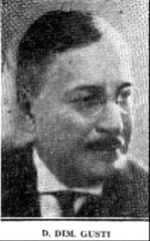- Dimitrie Gusti
-
Dimitrie Gusti (Romanian pronunciation: [diˈmitri.e ˈgusti]; February 13, 1880 – October 30, 1955) was a Romanian sociologist, ethnologist, historian, and voluntarist philosopher; a professor at the University of Iaşi and the University of Bucharest, he served as Romania's Minister of Education in 1932-1933. Gusti was elected a member of the Romanian Academy in 1919, and was its President between 1944 and 1946.
He was a prominent member of the Peasants' Party, and later of the National Peasants' Party into which the former had merged.
Contents
Biography
Born in Iaşi, he began studying Letters at the University of Iaşi before moving on to the Universität unter den Linden and the University of Leipzig, where he studied and completed a doctorate in Philosophy (1904). In 1905, he began the study of Sociology, Law, and Political economy at the Universität unter den Linden.
Gusti was appointed to the Department of Ancient History, Ethics and Sociology of the University of Iaşi in 1910, and was one of the main contributors to the creation of a new Romanian school of sociology. He moved to Bucharest in 1920, and began work as a professor at the University of Bucharest, in the Department of Sociology, Ethics, Politics and Aesthetics of the latter's Faculty of Letters and Philosophy. His lectures became a center of interest inside the academic community, and he attracted students with diverse backgrounds and political convictions (the far right Mircea Vulcănescu, the communist Miron Constantinescu, the Austromarxist Henri H. Stahl, and the left-wing artist Lena Constante).
Creator of the Bucharest School of Sociology and several Institutes, he also led, between 1925 and 1948, the intense research of Romanian villages and the publishing of its results as detailed monographs (a work in which he was notably assisted by Gheorghe Vlădescu-Răcoasa and Stahl). In 1936, together with Stahl and Victor Ion Popa, Gusti created the Village Museum in Bucharest.
He left the National Peasants' Party after 1938, disagreeing with its decision to oppose the authoritarian regime of King Carol II, and collaborated with the newly-created National Renaissance Front.[1] Consequently, he was threatened by the rise of the fascist Iron Guard (with the late 1940 establishment of the National Legionary State); following the Legionary Rebellion and the Guard's defeat, he sent a congratulatory telegram to Conducător Ion Antonescu.[2]
After the start of the Soviet occupation upon the end of World War II, Gusti was approached by the Romanian Communist Party with offers of collaboration. He was invited to attend official ceremonies inside the Soviet Union, and was a member of the Romanian Society for Friendship with the Soviet Union.[3]
He died in Bucharest, and was buried at Bellu cemetery.
Theory
Gusti defined his view on society as dependent on a set of principles:
- Society is composed of "social units", as groups of humans linked by a voluntary organizing activity and interconnected spiritually.
- The essence of life is "social will".
- "Social will" is expressed in economics and spirituality, both of which are regulated by law and politics.
- "Social will" is conditioned by factors which are included in four fundamental and parallel categories: cosmical, biological, psychological, and historical.
- The changes engineered by the factors are known as "social processes".
- The premeses of development one can observe in present society, and thus can predict with some accuracy, are known as "social trends".
A creator of the sociological monographic method (as still used by his Bucharest School), Gusti favored and theoretised first-hand intensive observation of social units and phenomena, as well as interdisciplinarity, with the research work being carried out through intensive collaboration within the field of social sciences, but also with doctors, agronomists, schoolteachers, etc.
Main works
- Egoismus und Altruismus, 1904
- Die soziologischen Betrehungen in der neuen Ethik, 1908
- Cosmologia elenă, 1929
- Sociologia militans, (vol. 1, 1935; vols. 2-3, 1946)
- Enciclopedia României, vols. I-IV, Bucharest, 1938, 1943
- Cunoaştere şi acţiune în serviciul naţiunii, (2 vols., 1939)
- Problema sociologiei, 1940
- La science de la réalité sociale, 1941
Notes
References
- Lucian Boia, ed., Miturile comunismului românesc ("The Myths of Romanian Communism"), Editura Nemira, Bucharest, 1998:
- Ovidiu Bozgan, "Traiectorii universitare: de la stânga interbelică la comunism" ("University Trajectories: from Interwar Left to Communism"), p.309-335
- Adrian Cioroianu, "Lumina vine de la Răsărit. «Noua imagine» a Uniunii Sovietice în România postbelică, 1944-1947" ("The Light Arises in the East. The Soviet Union's «New Image» of Postwar Romania, 1944-1947"), p.21-68
- (Romanian) Mircea Vulcănescu, Şcoala sociologică a lui Dimitrie Gusti ("Dimitrie Gusti's Sociological School")
- Ioan Scurtu, "PNL şi PNŢ: Rezerve, nemulţumiri, proteste. Partidele istorice sub guvernarea antonesciano-legionară" ("PNL and PNŢ: Reserves, Dissatisfactions, Protests, Historical Parties under the Antonesscu-Legionary Government"), in Dosarele Istoriei, 9/2000
Categories:- 1880 births
- 1955 deaths
- Burials at Bellu
- National Peasants' Party politicians
- People from Iaşi
- Presidents of the Romanian Academy
- Romanian historians
- Romanian philosophers
- Romanian sociologists
- Romanian writers in French
- University of Bucharest faculty
- Alexandru Ioan Cuza University alumni
- Alexandru Ioan Cuza University faculty
- University of Leipzig alumni
Wikimedia Foundation. 2010.

